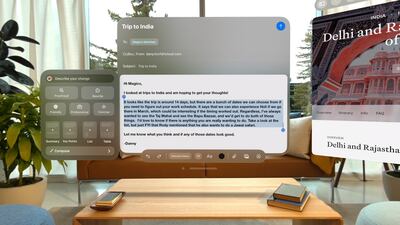Apple will be integrating Apple Intelligence on its Vision Pro mixed-reality headset, broadening the reach of its generative AI platform to appeal to more users as a challenge from Google emerges.
The service will be live on the $3,500 device in the visionOS 2.4 update to be released in April, Apple said on Friday, without providing a specific date. Among the Apple Intelligence features that will be available are writing tools, Genmoji creation and the Image Playground app.
The visionOS 2.4 update will also include a guest mode, in addition to a new function that, for the first time, will allow a Vision Pro owner to control the set-up process from an iPhone, as well as the ability to choose which apps a guest can use.
Exclusive to the Vision Pro will be "Create a Memory Movie" in the photos app, where users can create a movie by typing a description.

In addition, Apple will introduce a new dedicated Vision Pro app on the iPhone, coming on iOS 18.4, meant for viewing spatial content to the headset, including media from outside sources.
The iOS 18.4 is also part of a first beta developer release on Friday, alongside iPadOS 18.4 and macOS Sequoia 15.4.
The Vision Pro will join Apple hardware that already supports Apple Intelligence, including the iPhone 16 line-up, the iPhone 15 Pro models, iPad Air and Pro with M1 and upwards.
Also suitable are the A17 Pro iPad Mini, MacBook Air and Pro, iMac and Mac mini with M1 and later, the Mac Studio with M1 and upwards, and the M2 Ultra Mac Pro.
"We’re continuing to push the boundaries of what’s possible in spatial computing with visionOS 2.4,” Mike Rockwell, vice president of Apple's Vision products group, said in a statement.
The announcement is the second this week that involves Apple Intelligence's reach: on Wednesday, Apple made its first major product launch of 2025, introducing the iPhone 16e, the redesigned successor to the iPhone SE that also has the generative AI platform and a number of flagship features from the mainline iPhone 16 line-up.
The Vision Pro update also comes at a time when Apple, based in California, is trying to drum up interest in the Vision Pro, and amid Google's development of its own Android XR system, which is powered by the Alphabet-owned company's Gemini generative AI platform and is to be used in Samsung Electronics' own headset code-named Project Moohan.
Samsung said more details on Android XR and Project Moohan will be revealed this year.
Apple unveiled the Vision Pro at the 2023 Worldwide Developers Conference, with chief executive Tim Cook touting it as a new era of spatial computing.
Spatial computing involves the digitisation of interaction between machines, people, objects and their surroundings, enabling and enhancing action and engagement.
The device is controlled by the user’s eyes, hands and voice, and is intended to blend digital content with the physical world while using spatial experiences in the visionOS platform.
Reviews for the Vision Pro have been largely positive, mainly for its build quality, software and intuitiveness, despite its price tag.
Apple had said interest in spatial computing is rising, “with more than half of the Fortune 100 companies having purchased Apple Vision Pro to develop innovative solutions”.
The company added that the Vision Pro is “unlocking new opportunities for healthcare professionals and medical institutions in areas such as clinical education, surgical planning, medical imaging and behavioural health”.
Apple doesn't break down sales units per region, though data from Counterpoint Research shows that sales of the Vision Pro soared 211 per cent in the third quarter of 2024 from the first quarter of that year, when the device was launched. The International Data Corporation, meanwhile, said that the Vision Pro captured 17 per cent of the mixed reality headset market in the first three months of 2024
The company, however, had scaled back its production of the Vision Pro, The Information reported last October.


